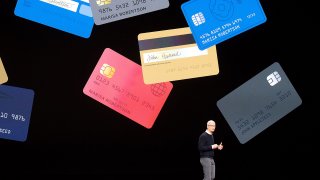
- The Apple Card's rapid growth and the platform Goldman Sachs built to service it resulted in some failures more reminiscent of a traditional issuer than a customer-first disruptor, according to people with knowledge of the matter.
- Regulators are focused on customer complaints from the past few years, and the biggest source of those came from attempted chargebacks, said the people.
- While the bank had automated ways for customers to log disputes through their iPhones, it had done less work on streamlining the resolution of such cases, according to the people.
When it unveiled its new credit card in 2019, Apple touted it as a gamechanger, with unheard-of levels of simplicity and transparency.
Behind the scenes, however, the card's rapid growth and the new platform built by Goldman Sachs to service it created difficulties, resulting in failures more reminiscent of a traditional issuer than a customer-first disruptor, according to people with knowledge of the matter.
Get San Diego local news, weather forecasts, sports and lifestyle stories to your inbox. Sign up for NBC San Diego newsletters.
Goldman struggled to handle a bigger-than-expected influx of disputed transactions, known in the industry as chargebacks, according to the people. Chargebacks happen when a customer seeks a refund for a product or service billed on their card for any of a number of reasons. The disputes, which put banks in the middle of disagreements between customers and merchants, have surged during the pandemic, according to payments consultants.
When an Apple Card user disputes a transaction, Goldman has to seek a resolution within regulatory timelines, and it sometimes failed at that, said the people, who requested anonymity to speak candidly about the situation. Customers were sometimes given conflicting information or had long wait times, the people said.
Goldman got more disputes than it counted on, said one source. "You have these queues that you need to clear out within a certain amount of time. The business was getting so big, suddenly we had to create more automation to deal with it."
Money Report
Goldman Sachs declined to comment for this article, and an Apple representative didn't respond to a detailed request for comment.
'A complete nightmare'
Problems at Goldman's card business burst into public view Aug. 4, when the New York-based investment bank disclosed a Consumer Financial Protection Bureau probe over a range of billing and service issues. Goldman made no mention of Apple in the filing, but most of its $11.84 billion in card loans to date are from the Apple Card; the bank launched a GM-branded card in January.
The regulator is looking into Goldman's customer dealings, "including with respect to the application of refunds, crediting of nonconforming payments, billing error resolution, advertisements, and reporting to credit bureaus," the bank said.
Regulators are focused on customer complaints from the past few years, and the biggest source of those came from attempted chargebacks, said the people.
The disputes can be thorny to resolve: Customers sometimes try to game the system by seeking refunds on legitimate purchases. In other cases, its merchants who aren't always forthcoming. While refunds involving identify theft or items that were never received should be clear-cut, there are also more nuanced cases where customers complain that an event like a music festival didn't live up to its billing.
In online credit-card forums, several users complained that Goldman initially refused to side with them even though they provided evidence of fraud.
"Goldman Sachs is holding me responsible for a $930 charge that was made at an Apple store with Apple Pay that I did not make," according to one Reddit post. "Until now, I've never experienced less professional service from a major company, and this has been a complete nightmare."
Edge cases
While the bank had automated ways for customers to log disputes through their iPhones, it had done less work on streamlining the resolution of such cases, according to the people. The bank hadn't initially accounted for what insiders deemed "edge cases," or situations that break from the norm among the vast majority of transactions, they said.
"We were making the case that we have a seamless way to dispute transactions," the source said. "But we got no credit for the front end, and we had some failures on the back end."
Another part of the puzzle is that Goldman relied on three outside vendors to help service Apple Card customers. Known as business process organizations, or BPOs, the sector often struggles with high worker turnover, increasing the odds that a representative is new or not fully trained.
In February, Apple sent some card users notice giving them a chance to resubmit old disputes, according to industry publication 9to5Mac.
The email acknowledged that Apple had "identified that some customer-initiated disputes may not have been resolved correctly," according to the report.
Growing pains
There are also plenty of customers on Reddit who say they've had good experiences with the Apple Card. The product won an award from J.D. Power for customer satisfaction last year.
The people with knowledge of the matter referred to the bank's issues as the growing pains of a new business that saw an unprecedented surge in customers. Apple Card users doubled to 6.4 million by May 2021 from a year earlier, according to Cornerstone Advisors. Outstanding loans by Goldman nearly doubled last year, according to the Nilson Report.
Goldman is still a relative newcomer to the U.S. credit card industry, and the Apple Card represented its biggest step yet into the financial lives of ordinary Americans. While the major card players rely on decades-old technology systems, the investment bank opted to build its own platform, said the people.
In response to the regulatory scrutiny, Goldman redirected resources to automate more of the chargeback process, one of the people said.
Meanwhile, frustrated Apple Card users in online forums said there was one surefire way to improve Goldman's response.
After "6 phone calls, 3 supervisors, and 4 months of waiting it was magically resolved," one Reddit poster wrote. "Suspiciously, it was resolved a few days after I filed a CFPB complaint stating all of my issues. If you run into the same thing, FILE A COMPLAINT with the CFPB."






